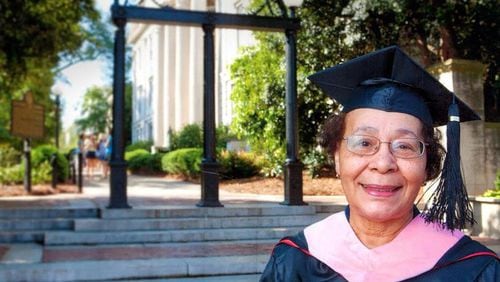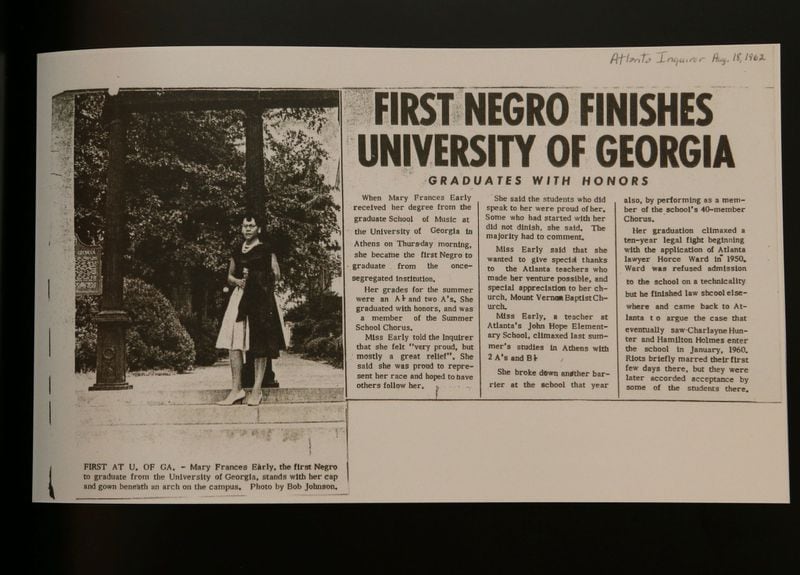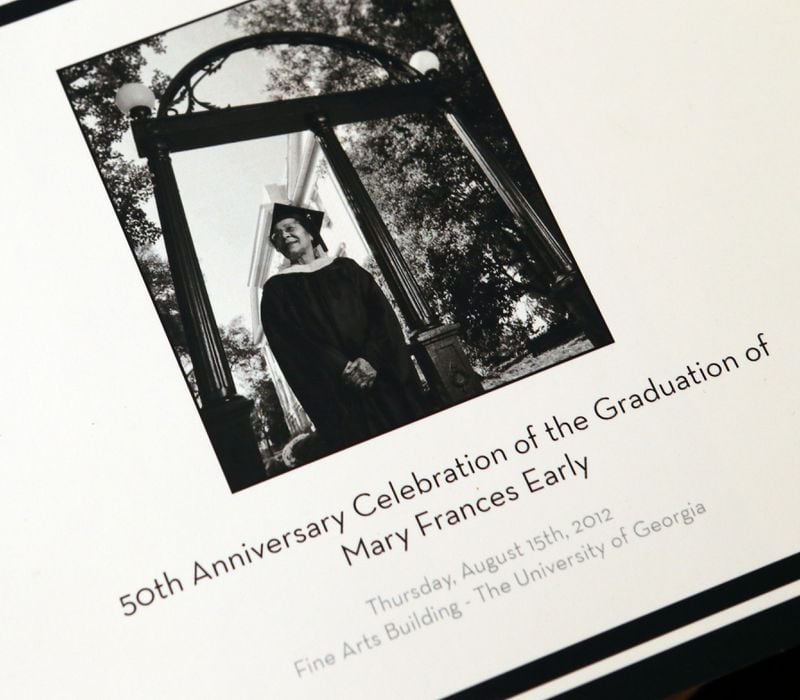Mary Frances Early, whose pioneering status as the first Black person to graduate from the University of Georgia was ignored for decades, details her story in a new book about her experience as a graduate student on the newly integrated Athens campus.
That story is an important chapter of Georgia’s history, according to Maurice C. Daniels, dean emeritus and professor emeritus of the University of Georgia School of Social Work.
In this guest column, Daniels, who helped highlight Early’s achievement, writes about her memoir. Daniels is author of “Ground Crew: The Fight to End Segregation at Georgia State,” “Saving the Soul of Georgia: Donald L. Hollowell and the Struggle for Civil Rights,” and “Horace T. Ward: Desegregation of the University of Georgia, Civil Rights Advocacy, and Jurisprudence.”
By Maurice C. Daniels
Dr. Carter G. Woodson observed, “Those who have no record of what their forebears have accomplished lose the inspiration which comes from the teaching of biography and history.” The University of Georgia recently published Mary Frances Early’s autobiography, “The Quiet Trailblazer: My Journey as the First Black Graduate of the University of Georgia.” The book presents Early’s deeply inspiring story, tracing her journey as a courageous foot soldier in the struggle for social justice.
On Aug. 16, 1962, Early became the first Black graduate of the University of Georgia and the first Black graduate of any of the so-called white public colleges and universities in the University System of Georgia.
In the mid-1990s, while researching a book and public television documentary chronicling the story of Horace T. Ward, I was privileged to interview many courageous lawyers and other leaders whose work was pivotal in achieving the U.S. Supreme Court victory that led to the desegregation of UGA. They included legendary attorney Donald L. Hollowell, Georgia’s chief civil rights lawyer during the 1950s and 1960s; prominent businessman and civil rights activist Jesse Hill; the bold and courageous Constance Baker Motley, who was the first Black woman to serve on the federal bench; and the eminent civil rights leader Vernon E. Jordan.
Through these interviews, I learned of Mary Frances Early, a little-known but significant figure in the desegregation of UGA. Vernon Jordan said of Early in his interview, “She came as a graduate student to the university, did very well, and was actually the first Black to earn a degree because she got her master’s degree before Hamp (Hamilton Holmes) and Charlayne (Hunter) were able to finish.” Jordan opined, “But she is a pioneer, too. She was not involved in the lawsuit and therefore did not share in the celebrity. That makes her no less of a celebrity in my judgment.”
Yet despite her historic achievement as the first African American graduate of UGA, Early had largely been overlooked by scholarly histories, omitted from media reports chronicling the Black freedom struggle, and even ignored by UGA itself. On the rare occasions when her story was mentioned, it was typically a mere footnote. Though I am deeply humbled and a bit embarrassed that Early repeatedly refers to me as her “discoverer,” it was Jesse Hill, Donald Hollowell, and Vernon Jordan who inspired me to chronicle her story.
I was privileged to interview Early on Feb. 19, 1997. She displayed a deep humility and modesty as she shared poignant stories about her loving and supportive family, her childhood in segregated Atlanta, her passion for education and stellar career in music education, and her commitment to the civil rights cause. In this deeply moving interview, Early also reflected on her struggle for admission to UGA, which her memoir discusses in great detail.
Early shared that despite being UGA’s first African American graduate, she had never been recognized or acknowledged by the university in the 35 years since her graduation. Though painfully disappointed that UGA had snubbed her for more than three decades, she graciously insisted that she harbored no ill will toward the university and returned to campus in 2000 for the premiere of a public television documentary, “Horace T. Ward and the Struggle to Enter the University of Georgia.”
In 2018, in collaboration with students and colleagues, I was pleased to produce the documentary “Mary Frances Early: The Quiet Trailblazer.” The documentary chronicles Early’s upbringing in Atlanta; her struggle, sacrifice, and triumph as a central figure in desegregating UGA; and her brilliant and pioneering educational career. Narrated by esteemed journalist Monica Pearson, the documentary has aired on Georgia Public Broadcasting numerous times, offering a glimpse into Early’s enduring legacy. Early’s memoir, however, provides us with the first full and comprehensive view of her compelling story.
I was deeply honored by Early’s request to write the foreword for her autobiography. “The Quiet Trailblazer” is a gracefully written, eye-opening firsthand account of Early’s resilience and her contributions to the Black freedom struggle. The book captures the authentic voice of an unsung grassroots activist who joined the civil rights movement to help defeat the ravages of Jim Crow.
In so doing, she laid significant groundwork that helped change the course of history at UGA, throughout our state, and across the nation. The narrative illuminates the determination and grit of a native-born Georgia citizen who overcame layer upon layer of white supremacy to make history as the first African American to graduate from a flagship university that had stubbornly maintained segregation for over 175 years.
Given the racial barriers UGA and the Board of Regents erected to block the admission of Black students and the second-class treatment Early endured in her journey to become UGA’s first Black graduate, it is poetic justice that UGA has bestowed its most distinguished honors upon her since her return to campus in 2000.
These distinctions include an honorary doctor of laws degree conferred by President Michael Adams in 2013; the prestigious President’s Medal presented by President Jere Morehead in 2018; the renaming of the College of Education as the Mary Frances Early College of Education, approved by the BOR in 2019; and now the publication of her memoir by UGA.
Credit: Phil Skinner
Credit: Phil Skinner
Her book captures Early’s civil rights work as well as the work of grassroots leaders such as Jesse Hill and Donald Hollowell, who helped her gain admission to UGA and supported her as she confronted blatant racism at the university in 1961 and 1962. Her story explores the solidarity of the Black community in the struggle to open UGA to Black students and the courage of white allies who stepped up to support Early as she faced resistance and turmoil at UGA.
This book captures Early’s courageous and tenacious efforts, which helped build the foundation to defeat Jim Crow in Georgia’s public colleges and universities and ultimately helped transform the South.
Early is one of the founders of a new UGA, a new Georgia, and a new South that make real the promise of democracy. She helped bring to life the Jeffersonian ideal, “We hold these truths to be self-evident, that all men (and women) are created equal, that they are endowed by their Creator with certain unalienable Rights, that among these are Life, Liberty and the pursuit of Happiness.” Each of us owes a debt of gratitude to Mary Frances Early: for her courage, her pioneering achievements, and her brilliant and stirring narrative.










